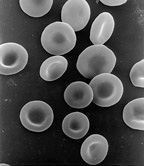
Photo from wikipedia
Following bariatric surgery, ongoing postoperative testing is required to measure nutritional deficiencies; the purpose of this study was to quantify the prevalence of these nutritional deficiencies based on two-year follow-up… Click to show full abstract
Following bariatric surgery, ongoing postoperative testing is required to measure nutritional deficiencies; the purpose of this study was to quantify the prevalence of these nutritional deficiencies based on two-year follow-up tests at recommended time points. A retrospective data analysis was conducted of all laboratory tests for bariatric patients who underwent surgery between May 2016 and January 2018 with available lab data (n = 397). Results for nine different nutritional labs were categorized into six recommended postoperative time periods based on time elapsed since the procedure date. Binary variables were created for each laboratory result to calculate descriptive statistics of abnormalities for each lab test over time and used in the individual GEE logistic regression models. Grouped logistic regression examined the total nutritional deficiencies of the nine combined nutrients considering total available labs. Multiple lab tests indicated a very low frequency of abnormalities (e.g., Vitamin A, Vitamin B12, Copper, and Folate). Many of the nine included nutritional labs had an average deficiency of less than 10% across all time points. The grouped logistic model found preoperative nutritional deficiency to be predictive of postoperative nutritional deficiency (OR 3.70, p < 0.001). We found the vast majority of routine lab test results to be normal at multiple time points. Current practice can add up to significant lab expenses over time. The frequency of postoperative testing in this population may be redundant and of very little value. Unnecessary follow-up laboratory testing costs the patients and the health care system in both time and resources. Patients with preoperative deficiencies appear to be at higher risk for nutritional deficiencies when compared to bariatric surgery patients that did not have preoperative nutritional deficiencies. Future research should focus on defining cost effective postoperative lab testing guidelines for at risk bariatric patients.
Journal Title: Surgical Endoscopy
Year Published: 2019
Link to full text (if available)
Share on Social Media: Sign Up to like & get
recommendations!